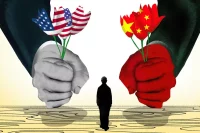
The Balance of Soft Power
In the post–Cold War era, few concepts have more profoundly shaped discussions of U.S. foreign policy than the idea of “soft power”. The term was coined by the American political scientist Joseph Nye in his 1990 book, Bound to Lead, in which he defined it as “getting others to want what you want”. But Nye wasn’t just trying to illuminate an element of national power. He was also pushing back against arguments that the United States was facing an impending decline. To the contrary, Nye argued that alongside its military prowess and economic strength, the United States enjoyed a massive advantage over any potential rivals thanks to its abundant soft power, which rested on “intangible resources: culture, ideology, [and] the ability to use international institutions to determine the framework of debate”.… Seguir leyendo »


